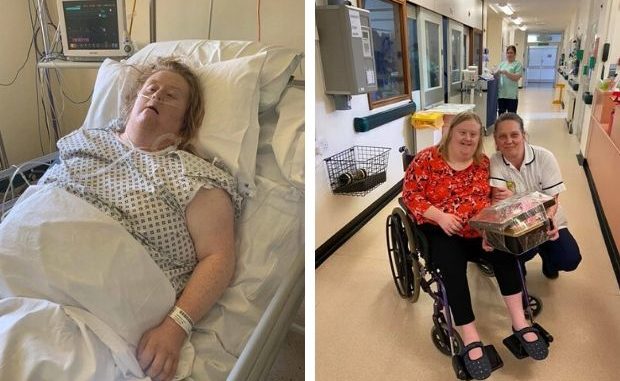
After battling for her life against Covid-19, Natalie Stephens is now learning to walk again and raising money for East Kent Mencap at the same time.
Natalie, who has Down’s syndrome and is an East Kent Mencap regular attending sessions in both Margate and Ramsgate, first became ill in March and eventually was taken into QEQM Hospital.
A six week fight against the virus meant Natalie spent 15 days on a ventilator, had three bouts of pneumonia and then weeks of work to learn how to move and talk again.
On Friday, May 8, Natalie was finally able to return to her Broadstairs home but the journey to recovery is still ongoing.
Natalie lives near the 39 Steps, the subject of the famous book by John Buchan. She is having to learn to walk again and is aiming to do that independently and build up to taking her own 39 Steps.
East Kent Mencap has supported Natalie,30, throughout her time in hospital and return home and it is hoped that any money raised could help others like Natalie affected by COVID-19.
The fundraiser has a £1,000 target and has reached almost half that in less than 24 hours.
Find the fundraiser here
Natalie’s mum Linda spoke to The Isle of Thanet News last month about her daughter’s fight for survival.
“It was a really traumatic journey. In my darkest times I was looking for hope but there wasn’t much out there, I want this to give hope to others when they need it.”
Linda Crichton has been through six terrifying weeks, at one point not even knowing whether daughter Natalie would survive after being put on a ventilator while Covid-19 attacked her body.
But on Friday (May 8) Natalie, 30, was finally able to return to her Broadstairs home following 15 days on a ventilator, three bouts of pneumonia and then weeks of work to learn how to walk and talk again.
Natalie, who is an East Kent Mencap regular attending sessions in both Margate and Ramsgate, first became ill on March 20 with a bad throat and temperature. A couple of days later she had stopped eating and was so weak she was struggling to get out of bed.
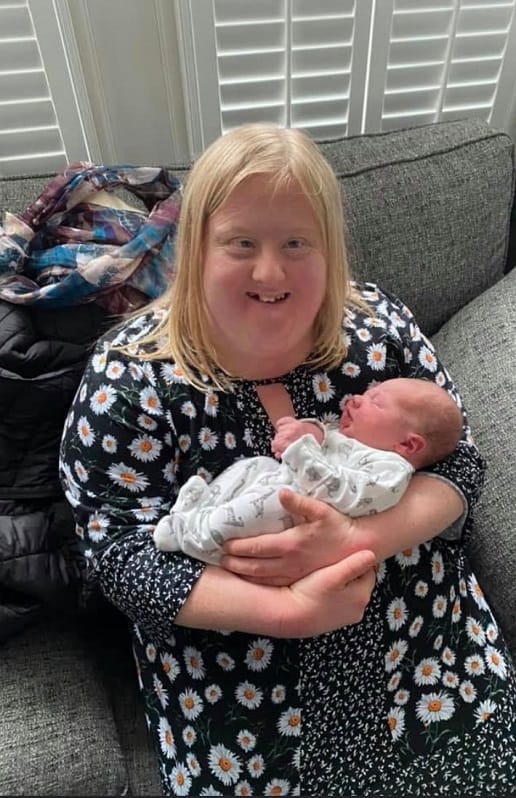
Mum-of-four Linda said: “She had an awful cough and was coughing until she was sick. I was so worried I called 111 and they sent us to QEQM. We waited about five hours and when she was seen they said it might be covid but sent us home as she wasn’t too ill. That was the Friday. On the Sunday, she was worse, her breathing was fast, she was coughing until she was sick and she still hadn’t eaten.”
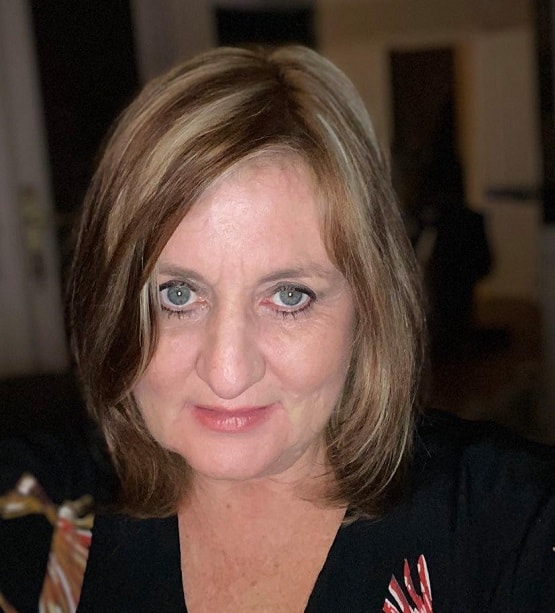
Linda called 111 again and paramedics came to the house but Natalie was not thought to be sick enough to need hospital care.
Just two days later Linda called 999 after Natalie deteriorated further. She said: “An ambulance came out and they said Natalie needed to go to hospital right away. They phoned ahead and when we got there she was seen right away. She had been given an X Ray previously but the consultant wanted a CT scan. They said she had pneumonia on both lungs and at first wanted her to go to ICU but then took her to Sandwich Bay respiratory ward.
“We were in a side room and I was so worried as her breathing was really bad so I rang the nurse buzzer.
“An emergency doctor was called and they said she needed 94% oxygen. They put her on a ventilator in the recovery area that they were using as a second ICU. I sat with her until she was sedated and then I was told I had to go.”
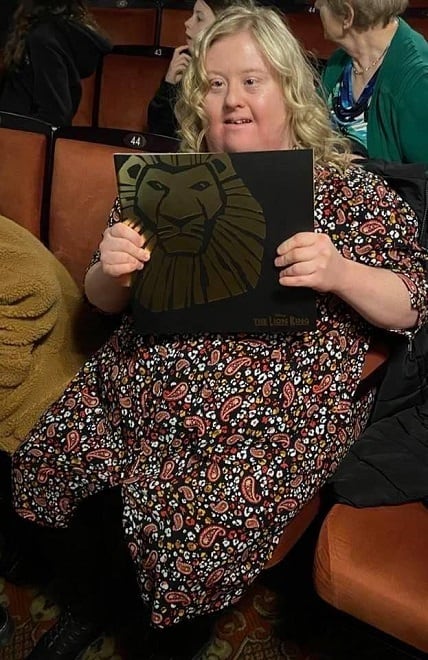
It was the beginning of a frightening and traumatic time for Linda and her family.
She said: “I got a call in the evening telling me Natalie was critically ill. I was told I had to be prepared. At that time not many people going onto ventilators in ICU were making it. I was so distressed. My son and daughter at home with me were so upset. Natalie had such a small chance of making it that I wanted to bring her home so she wasn’t surrounded by strange voices.
“Fiona, our learning disability nurse, phoned the hospital but I wasn’t allowed in and Natalie had to stay there. The next day she was still critically ill and was being given medication to keep her heart, lungs and kidneys functioning. The hospital staff were doing their best for her.”
It was at that point that Linda started to scour the internet to try and find stories of covid survivors. She said: “There wasn’t much out there but I did find a New York Times report saying how people in a coma can often hear everything around them even though they can’t respond.”
The report sparked an idea for Linda. Phones and wifi are not allowed in ICU because of the interference caused for the medical equipment but Linda decided to get lots of messages for Natalie put onto a CD.
She said: “My daughter was covid positive, my son was ill and I was having to self isolate but I got someone to buy me a CD player and my niece and other son put everything on a CD from the family.
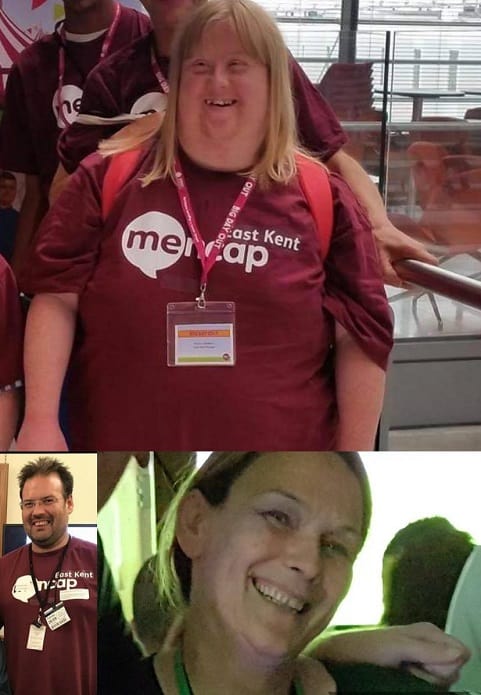
“I contacted East Kent Mencap to ask them if they could help as Natalie was in ICU and must have been so frightened by all the beeping and the strange voices. Within a couple of hours staff member Tris had done a CD with messages and songs that meant a lot to Natalie and had put it through my letterbox.”
Linda contacted QEQM a couple of times and when she reached a consultant on duty he said the CD and player could be brought in. He also got a video link set up so Linda could see her daughter.
She said: “It was fantastic. The staff on ICU thought the CD was so lovely they said they were going to suggest doing it to other families.”
After a week Natalie began to make progress, giving the family a glimmer of hope, but when staff tried to reduce sedation Natalie became very distressed and tried to get out of bed and remove her tubes and so had to be sedated again.

After Linda found guidelines that people with learning difficulties should be allowed a family member in hospital with them, even in covid cases, if possible, arrangements were made for her dad to visit, then her brother Harry. Because of underlying health conditions Linda had to wait before she could go back to the hospital.
During that period Natalie suffered another bout of pneumonia brought on by being on the ventilator, extending her time in ICU.
But eventually she was strong enough to be moved to Quex Ward for recovery and Linda was able to see her daughter again.
She said: “When Natalie came off the ventilator she was so weak she couldn’t even lift her fingers or talk. She was very traumatised and thought everyone around her had died. She needed a lot of reassurance.”
In Quex Ward the road to recovery began. Natalie had to learn to move and talk again. She had twice daily therapist sessions. Linda was by her side every night and Mencap staff member Maria was there every day.
Linda said: “Maria was amazing,. Mencap are amazing. The NHS staff were all amazing.”
Natalie was clapped out of QEQM hospital by staff on Friday and is now continuing her recovery at home with visits from physio, occupational therapy and psychology staff.
Linda said: “The hospital staff were outstanding. We are so lucky to have the NHS and we need to cherish it.
“Natalie is in good spirits now. She has been chatting to her friends at Mencap and is getting stronger.
“I just want people to know that it is really hard but there is hope and I want other people to take inspiration from Natalie and see that they can get through it and they will be able to rebuild their lives.”

